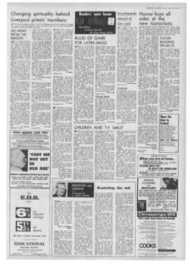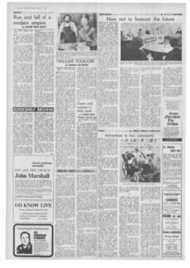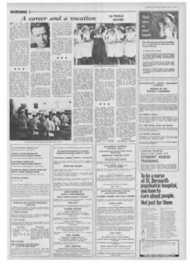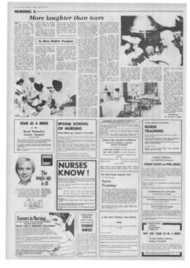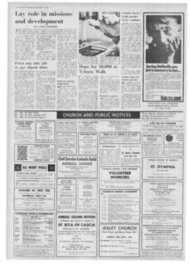Page 3, 24th April 1970
Page 3

Report an error
Noticed an error on this page?If you've noticed an error in this article please click here to report it.
Tags
Share
Related articles
Rev. J. Fallon, S.j.
Citizens Of All Creeds Pray For Peace
Desperate Need For Dialogue With Jews
GABRIEL FALLON'S DUBLIN DIARY
St. Patrick's for all
PERHAPS the most notable ecumenical gesture since Vatican II came to the Diocese of Dublin a little over a week ago. In the course of a radio programme on "Disestablishment" the Dean of St. Patrick's Cathedral, the Very Rev. Victor Griffin, put forward the hope that while St. Patrick's was the national cathedral of the Church of Ireland it could one day become Ire land's national cathedral "in a much deeper and wider sense."
Developing this point he declared that if St. Patrick's were to be shared for worship by all the great Christian communities it would produce a situation in which its witness would be evermore effective than it is Asked if he could see such a development happening in the foreseeable future, he admitted that there were, of course, a great many difficulties. legal and otherwise, standing in the way. However, he added: "We in the Church of Ireland should work hard in order that this vision can be implemented."
Interviewed further on the matter (this time by the Irish Times) Dean Griffin said he believed that many people in the Church of Ireland would be in favour of this proposal. There were. of course, others, he agreed, to whom this would appear as a "sell-out" or as the first step in watering down. the heritage of the Church of Ireland. "But nothing," he said, "could be further from the truth."
Commenting on the proposal the Irish Times in a second leader pointed out that perhaps the best-known rule of ecumenism was that everything is impossible until it hap pens. Indeed, there is much truth in this contention. Even Vatican II was an impossibility in the opinion of many knowledgeable people. "If enough people," continues the Irish Times, "think that it should be done, it can be done."
But what about our side of the fence? It seems only yesterday that in paying the last. respects to some dear friends of ours (Lennox Robinson and Barry Fitzgerald particularly come to the writer's mind) one was compelled to stand rather shamefacedly outside the walls of this storied Cathedral in deference to ecclesiastical law.
Thankfully the effect of the Council and the generous examples to be seen elsewhere put an end to all this. And I know at least one elderly gentleman who as a result of reading the first lesson at an evening service in memory of the great Dean Swift of this cathedral is not likely to lose one iota of his faith as a member of "the gxeat Latin Church of the West." Whatever the outcome of Dean Griffin's suggestion let us hope it helps to bring us closer to each other as brothers in Christ.
Problems of ecumenism
Divergencies of a doctrinal, liturgical and disciplinary nature fill have to be examined, at the proper time and place, in a spirit of fidelity to truth and of understanding in charity. What can and must now begin to develop is that fraternal charity which is ingenious in discovering new ways of showing itself . . ." Thus Pope Paul VI in his format greeting to Ecumenical Patriarch Athengoras of Constantinople. 6 January, 1964.
LAST WEEK at Gonzanga College Chapel, Dublin, in the course of an ecumenical act of worship, a commemorative volume of essays marking the centenary of the disestablish'pent of the Church of Ireland and edited by the Rev. Michael Hurley, Sal., professor of dogmatic theology at the Milltown Theological Institute was presented to the Most Rev. G. 0. Simms, Primate of All Ireland.
The essays were contributed by a group of Methodist, Presbyterian, Quaker and Roman Catholic scholars. "It was really the academic institutions I planned to involve," said Fr. Hurley, "and they're all there except Trinity College and Maynooth. I'm very disappointed that there were no representatives from these colleges, but those who were writing had to withdraw owing to unforeseen circumstances when the project was already in train."
Oh, those "unforeseen circumstances"! All kinds of guesses—mostly inaccurate—are bound to be made. Fr. Hurley, who has edited John Wesley's "Letter to a Roman Catholic" and has written a comment on Calvin's "Instir tutes," paid a warm tribute to the help and encouragement he had received from Church of Ireland scholars and friends.
He suggested that one of the main problems in ecumenism today is that Church leaders get involved in ecumenical conversations and very often fail to promote actual ecumenism. "This, as you know," he said, "means doing everything together as far as conscience permits— and that's a hell of a lot. The only thing that's excluded— and that's debated—is interconununion."
Unfortunately, far too many of us confine our ecumenical activity to a you-join-us-or-else attitude. We would do well from time to time, even while taking care not to offend against revealed doctrine and the norms of the Church, to remind ourselves of the danger of complacency and of that Christ who cursed the barren fig tree which produced many green leaves but no fruit.
Pravda on Bogside
TIME was when we could boast that the editor of the Skibbereen Eagle was keeping a close eye on the Czar of Russia. Now it seems that the position is reversed. Early this year the Komsotnolskya Pravda sported a headline, "Ulster for Bernadette," and it didn't mean Bernadette of Lourdes. In or around the same time Boris Izakov had a long article in the Literaturnaya Gazeta in the course of which he compared the defence of Bogside "to the heroic story of the Paris Commune."
"When I walked through the dark streets of the Bogside and the Falls Road with their slum dwellings, and when chatted with the men and women who organised the defence of these areas," he wrote, "I could not fail to sense the real significance of the Ulster events."
Fair enough; but I doubt if Bogside and Falls Road Catholics would be pleased to accept Boris's comparison with the Paris Commune. It is much too close to the Rev. Ian Paisley's dismissal of them as Vatican-inspired Cornmunists. It does seem as if we will have to revive our longdefunct watchdog the Skibbereen Eagle.
blog comments powered by Disqus






